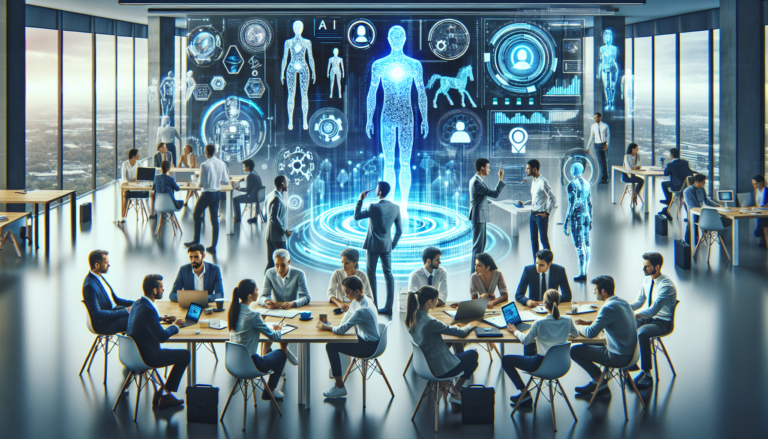# AI and Human Coaches: The Future of Org Development

In the fast-evolving world of organization development, the role of coaching has always been pivotal in enhancing leadership, talent management, and HR practices. However, with the advent of artificial intelligence (AI), a new paradigm is emerging in the form of AI-powered coaching tools. These tools are changing the landscape of org development by augmenting and sometimes even replacing human coaches in various aspects of leadership, talent management, training and development, and succession planning.
## The Rise of AI in Org Development
AI has permeated nearly every industry, and org development is no exception. Organizations are increasingly turning to AI-powered solutions to streamline processes, make data-driven decisions, and enhance employee experiences. In the realm of coaching, AI is being leveraged to provide personalized, on-demand support to employees at all levels.
As we delve deeper into the realm of organizational development, it becomes increasingly apparent that leveraging cutting-edge technology is essential for sustainable growth and efficiency. One such innovative tool that is revolutionizing the way companies approach their organizational strategies is OrgDev.ai. By harnessing the power of artificial intelligence, OrgDev.ai offers comprehensive solutions for optimizing workforce performance, streamlining processes, and fostering a culture of continuous improvement. Incorporating OrgDev.ai into your organizational development initiatives can provide invaluable insights and drive positive change across all facets of your business operations, propelling you towards greater success and competitiveness in the modern business landscape.
One of the primary advantages of AI coaching tools is their ability to offer scalable solutions. While human coaches are limited by time and resources, AI can cater to a large number of employees simultaneously, providing real-time feedback and suggestions for improvement. This scalability is particularly beneficial for organizations with geographically dispersed teams or those looking to implement consistent coaching practices across the board.
## Augmenting Human Coaches with AI
Contrary to popular belief, AI is not here to replace human coaches but rather to complement their efforts. AI-powered coaching tools can handle routine tasks, such as scheduling coaching sessions, gathering feedback, and tracking progress, allowing human coaches to focus on more strategic and nuanced aspects of their roles.
By leveraging AI, human coaches can gain deeper insights into employee behaviors, preferences, and performance patterns. AI algorithms can analyze vast amounts of data to identify trends, predict future outcomes, and recommend tailored coaching interventions. This data-driven approach equips human coaches with the information they need to make informed decisions and adapt their coaching strategies to the unique needs of each individual.
## The Power of Personalization in Coaching
One of the key benefits of AI in coaching is its ability to deliver personalized experiences to employees. Through the use of machine learning algorithms, AI coaching tools can create individualized development plans based on each employee’s strengths, weaknesses, and goals. This level of personalization ensures that coaching interventions are relevant, engaging, and effective.
Moreover, AI can offer continuous support to employees beyond scheduled coaching sessions. Through chatbots, virtual assistants, and other AI-powered interfaces, employees can access coaching resources, receive feedback, and track their progress in real time. This seamless integration of AI into the coaching process fosters a culture of continuous learning and development within the organization.
## Overcoming Challenges and Harnessing Opportunities
While AI presents numerous opportunities for enhancing coaching practices in org development, it also brings forth challenges that need to be addressed. One of the primary concerns is the potential loss of human touch in coaching interactions. Employees may feel disconnected or disengaged when interacting with AI coaching tools, especially if they prefer the personal connection that human coaches provide.
To overcome this challenge, organizations need to strike a balance between AI and human coaches, ensuring that there is ample opportunity for face-to-face interactions and personalized guidance. By integrating AI into existing coaching programs thoughtfully and strategically, organizations can harness the full potential of both AI and human coaches to drive org development initiatives forward.
## The Future of Coaching: A Harmonious Blend of AI and Human Expertise
In conclusion, the integration of AI into coaching practices represents a promising frontier in org development. By combining the analytical capabilities of AI with the empathy and intuition of human coaches, organizations can unlock new possibilities for leadership development, talent management, and HR initiatives. Success in org development lies in recognizing the unique strengths that AI and human coaches bring to the table and leveraging them in a harmonious blend that propels the organization towards its goals.
OrgDev.ai